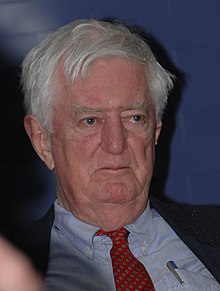Oliver Selfridge
Oliver Gordon Selfridge (born May 10, 1926 in London , † December 3, 2008 in Boston ) was a British pioneer of artificial intelligence .
Selfridge was the grandson of chain store founder Harry Gordon Selfridge , but he never met (his father had an employee at Selfridge and kept the marriage a secret). The family lost control of the trading company in the Great Depression. Selfridge attended Malvern College in England and after the family moved to the United States at the beginning of World War II, the Middlesex School in Concord , Massachusetts. He studied mathematics at the Massachusetts Institute of Technology with a bachelor's degree in 1945. He did his military service in the US Navy and was then a student of Norbert Wiener at MIT, but never completed his doctoral thesis. He wrote important early papers on pattern recognition, neural networks, and machine learning. An influential work from 1958 (Pandemonium: a paradigm for learning) he described networks of agents (called demons) for pattern recognition and for imitating the functioning of the brain, where demons correspond to specialized nerve cells that perform various tasks of pattern recognition (feature demons for detection a specific property, cognitive demons for information consolidation, decision demons for decisions). In 1956 he co-organized the Dartmouth Conference , which co- founded the field of artificial intelligence with the two pioneers of AI, Marvin Minsky and John McCarthy from MIT. In the 1960s he was Associate Director of Project MAC at MIT (led by JCR Licklider ), where time sharing was developed, among other things. During this time he was mostly at MIT's Lincoln Lab. He was then at Bolt Beranek and Newman and from 1983 chief scientist of the telephone company GTE Corporation . In 1993 he retired.
Since the 1950s he has been an advisor on US national security issues, including on the President's Foreign Intelligence Advisory Board and the Scientific Advisory Board of the National Security Agency , where he was for twenty years.
JCR Licklider and Robert W. Taylor expanded upon Selfridge's ideas in their influential 1968 essay The Computer as a Communication Device, naming an early idea of an intelligent personal assistant in it as Oliver (for On-line interactive vicarious expeditor and responder and in honor of Selfridge ).
Selfridge also wrote children's books (Sticks, Fingers Come In Fives, All About Mud, Trouble With Dragons). He was married twice (both marriages ended in divorce) and had four children.
Web links
Individual evidence
- ↑ Published in Symposium on the mechanization of thought processes, London: HM Stationary Office 1959
- ^ Science and Technology, April 1968
| personal data | |
|---|---|
| SURNAME | Selfridge, Oliver |
| ALTERNATIVE NAMES | Selfridge, Oliver Gordon |
| BRIEF DESCRIPTION | British computer scientist |
| DATE OF BIRTH | May 10, 1926 |
| PLACE OF BIRTH | London |
| DATE OF DEATH | December 3, 2008 |
| Place of death | Boston |
